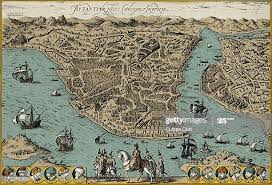The rise and fall of the Ottoman Empire
The Ottomans conquered Constantinople (present-day Istanbul) in 1453 and established an empire. Sultan Salim I, 1520-1467, who had thwarted the advance of the Iranian Safavids, turned into a victorious war, which brought Syria and Egypt, and later North Africa and the Arab states, under Ottoman rule. Conquests continued in the West as well, and in 1530 the Turks reached
Vienna. The reasons for the success of the vast empire were as follows: “The sultan neither imposed monotony on his subjects nor forced the different elements of his empire to merge into one large party. The government would only formulate a law under which various groups of Christians, Jews, Arabs, Turks, Berbers, merchants, scholars, Sufis and trade organizations would live in peace and order. Everyone played their part and followed their own beliefs and customs. The important thing was that the Ottoman subjects were proud to belong to a sharia state. The teachings of the Qur'an were that the Ummah would be prosperous if it followed the rules of the Qur'an.
The reason for the decline of the Turks was also the failure of the rulers to support the expansion of the kingdom, which had a lavish agrarian society, which weakened the military system. Economic instability led to corruption and tax evasion. On the one hand, the revenue was declining, but on the other hand, the luxury of the rulers continued.
The result of Turkish concessions to Europeans
The Ottomans initially inflicted heavy defeats on the European powers, but by the end of the eighteenth century they were unable to confront them or deal with them on an equal footing. Under these circumstances, the European merchants who were given special privileges by the Ottomans and allowed to remain free from the restrictions of the law began to raise their heads. The crimes of these Europeans were tried in their own courts according to their own laws and only European lawyers appeared in these courts. These Ottoman guests, seeing the weakening empire, got out of control and adopted a rebellious attitude.
Commentary on the religion of Islam
Paying homage to the religion of Islam, Karen Armstrong writes that although the three great Muslim empires had fallen by the end of the eighteenth century, it was not the nuclear incompetence or misfortune of Islam as Europeans often think arrogantly. The life span of every agrarian society is limited and these Muslim states which were the last model of agrarian society had become their own and every time the Muslims rose from the dust like a cage to the sky and continued to perform great deeds. Were
Vienna. The reasons for the success of the vast empire were as follows: “The sultan neither imposed monotony on his subjects nor forced the different elements of his empire to merge into one large party. The government would only formulate a law under which various groups of Christians, Jews, Arabs, Turks, Berbers, merchants, scholars, Sufis and trade organizations would live in peace and order. Everyone played their part and followed their own beliefs and customs. The important thing was that the Ottoman subjects were proud to belong to a sharia state. The teachings of the Qur'an were that the Ummah would be prosperous if it followed the rules of the Qur'an.
The reason for the decline of the Turks was also the failure of the rulers to support the expansion of the kingdom, which had a lavish agrarian society, which weakened the military system. Economic instability led to corruption and tax evasion. On the one hand, the revenue was declining, but on the other hand, the luxury of the rulers continued.
The result of Turkish concessions to Europeans
The Ottomans initially inflicted heavy defeats on the European powers, but by the end of the eighteenth century they were unable to confront them or deal with them on an equal footing. Under these circumstances, the European merchants who were given special privileges by the Ottomans and allowed to remain free from the restrictions of the law began to raise their heads. The crimes of these Europeans were tried in their own courts according to their own laws and only European lawyers appeared in these courts. These Ottoman guests, seeing the weakening empire, got out of control and adopted a rebellious attitude.
Commentary on the religion of Islam
Paying homage to the religion of Islam, Karen Armstrong writes that although the three great Muslim empires had fallen by the end of the eighteenth century, it was not the nuclear incompetence or misfortune of Islam as Europeans often think arrogantly. The life span of every agrarian society is limited and these Muslim states which were the last model of agrarian society had become their own and every time the Muslims rose from the dust like a cage to the sky and continued to perform great deeds. Were






Good job!
ReplyDeleteNice information
ReplyDelete